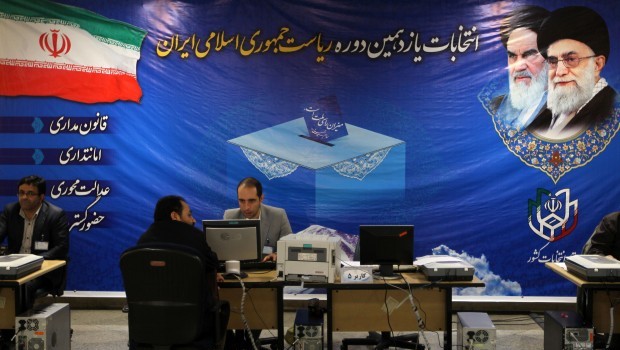
Iranian men register their candidacy for the upcoming presidential election at the interior ministry in Tehran on May 9, 2013. Iran began a five-day registration period for candidates in Iran’s June 14 presidential election, with a string of conservative hopefuls in the running but with key reformists yet to come forward, media reports said. (AFP PHOTO/ATTA KENARE)
According to the Entekhab news website, he made his comment immediately after submitting his application for candidacy at the Interior Ministry, while answering questions from reporters.
Rouhani will be the main reformist candidate if neither Hashemi Rafsanjani nor Mohamamd Khatami decide to run in the upcoming June 14 election. Rafsanjani has not yet announced whether or not he will run, although his decision will become clear by the Saturday, May 11 deadline to submit applications. His decision will also determine the reformist/moderate camp formation.
Dr. Mansoor Farhang, the first Iranian representative to the UN after the Islamic Revolution, told Asharq Al-Awsat that the “presence or absence of Hashemi Rafsanjani in Iran’s upcoming election is of little importance, as he has lost his previously significant influence within Iran’s security and military circles.”
Farhang regards the fuss around Hashemi Rafsanjani’s nomination a “tactic merely concerned with preserving his remaining status within the regime.”
On the third day of registration, both Iran’s former intelligence minister, Ali Fallahian, and Mohammad-Baqer Kharazi, the secretary-general of Iranian Hezbollah, submitted applications.
None of three candidates of the 2+1 coalition said to be favored by Ayatollah Khamenei, Mohammad Bagher Qalibaf, Ali Akbar Velayati, have registered yet. The lingering uncertainty over who the other candidates will be has prevented the 2+1 coalition from finalizing their choice of nominee.
Speaking to the FARS news agency, Gholam Ali Haddad Adel announced that “the three members of the coalition will register and wait until the vetted candidates are declared by the Guardian Council.”
Mohamamd Baqer Qalibaf also reiterated his promise that he “will act according to the coalition pact to support only one candidate,” FARS news agency reported on Thursday. It is understood that the 2+1 coalition will choose the most popular of the three candidates as determined by a pre-election poll.
Also on Thursday, Hojjat Al-Islam Musa-Pur, a spokesperson for another conservative coalition nicknamed the “Coalition of 5,” confirmed that it will nominate Hojat Al-Islam Abutorabi-Far, the deputy speaker of the Majlis. This coalition is made up of mid-ranking conservative MPs and former ministers. It is believed that they are trying to secure a share of the cabinet seats, as it is widely thought that their candidate has no chance of winning.
In a parallel development, the Iranian judiciary has held the seventh court session questioning three previously influential judiciary officials accused of misconduct that lead to the deaths of four detainees arrested in the midst of the 2009 election unrest, said the pro-reform website Kalameh on Wednesday, May 8.
Saeed Mortazavi, the former chief prosecutor in Tehran, is among the accused who are being questioned by the court. The judge has prohibited the media from reporting on proceedings.
